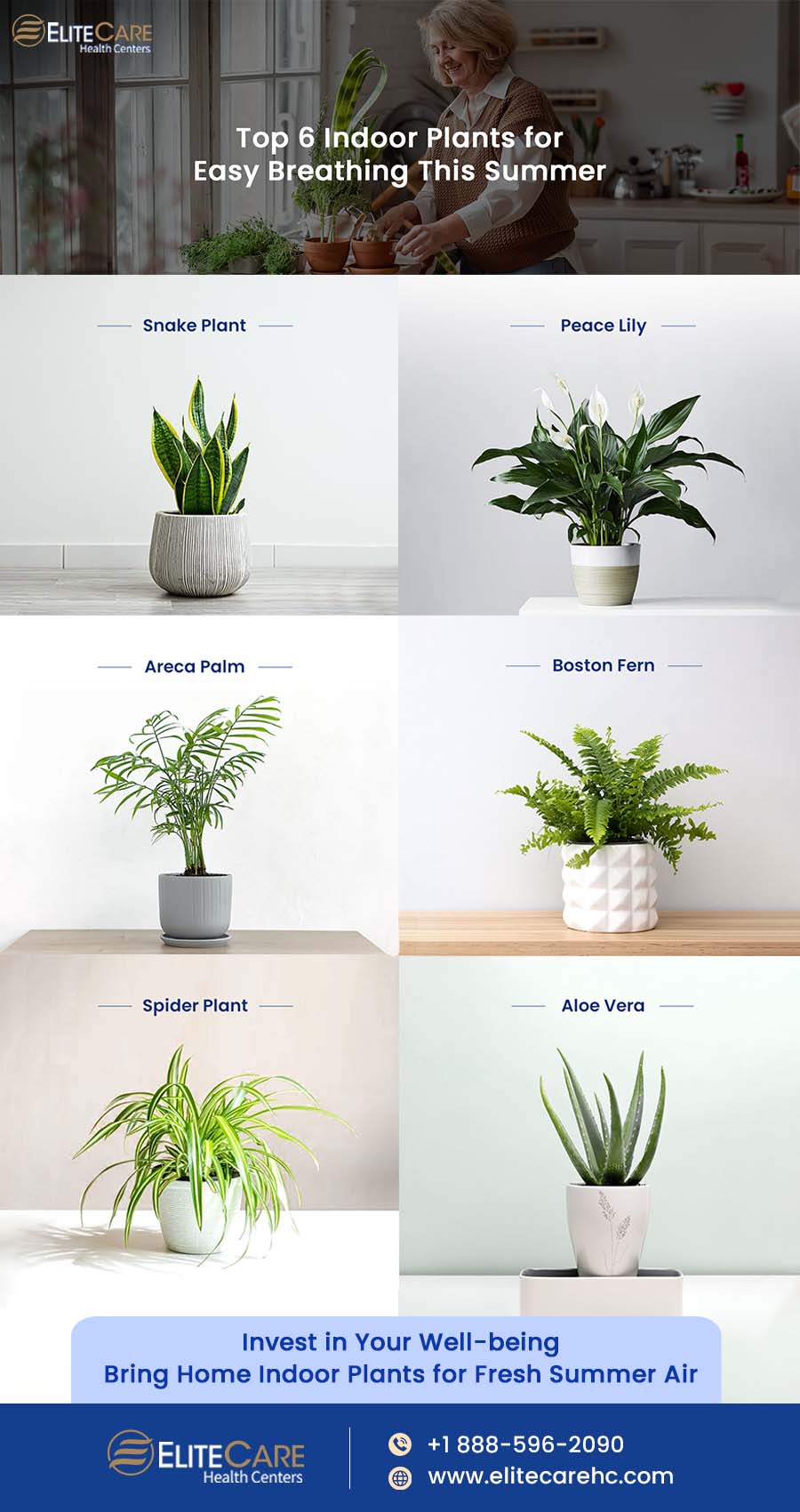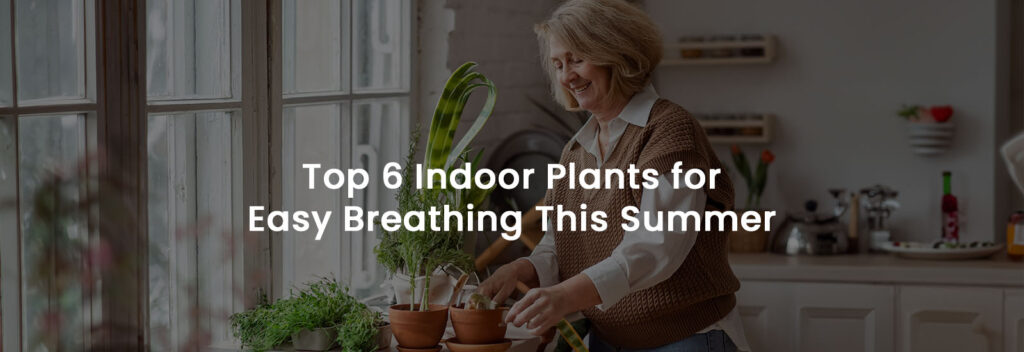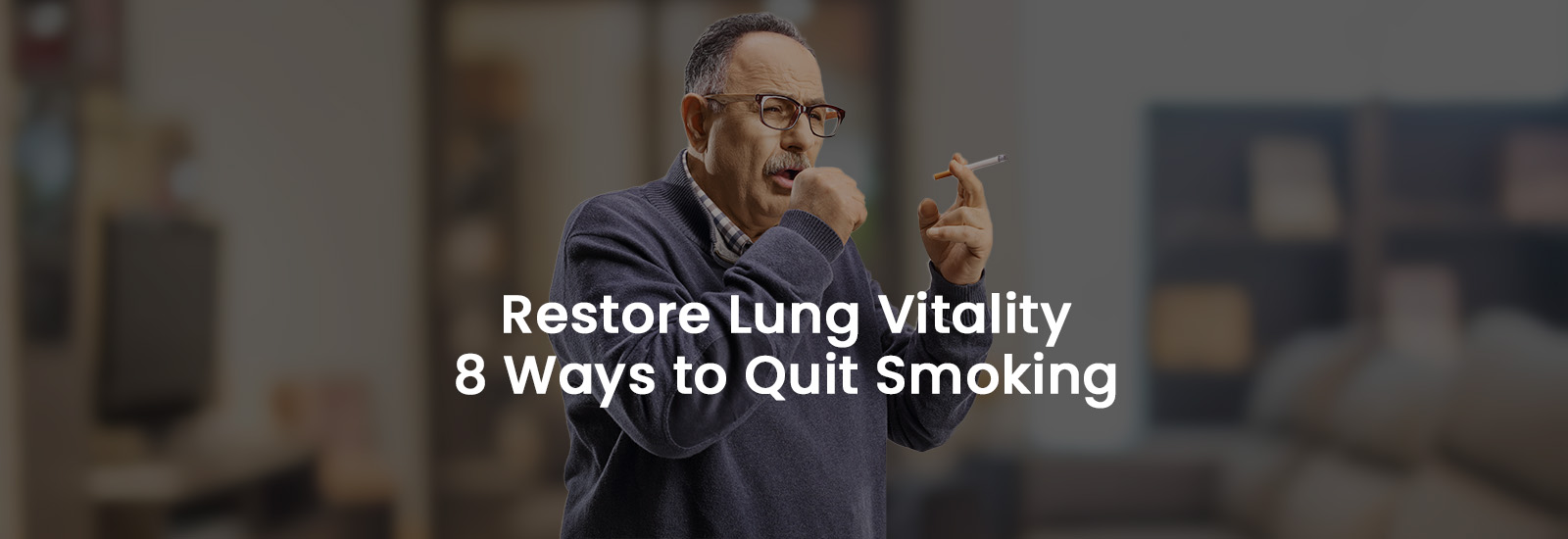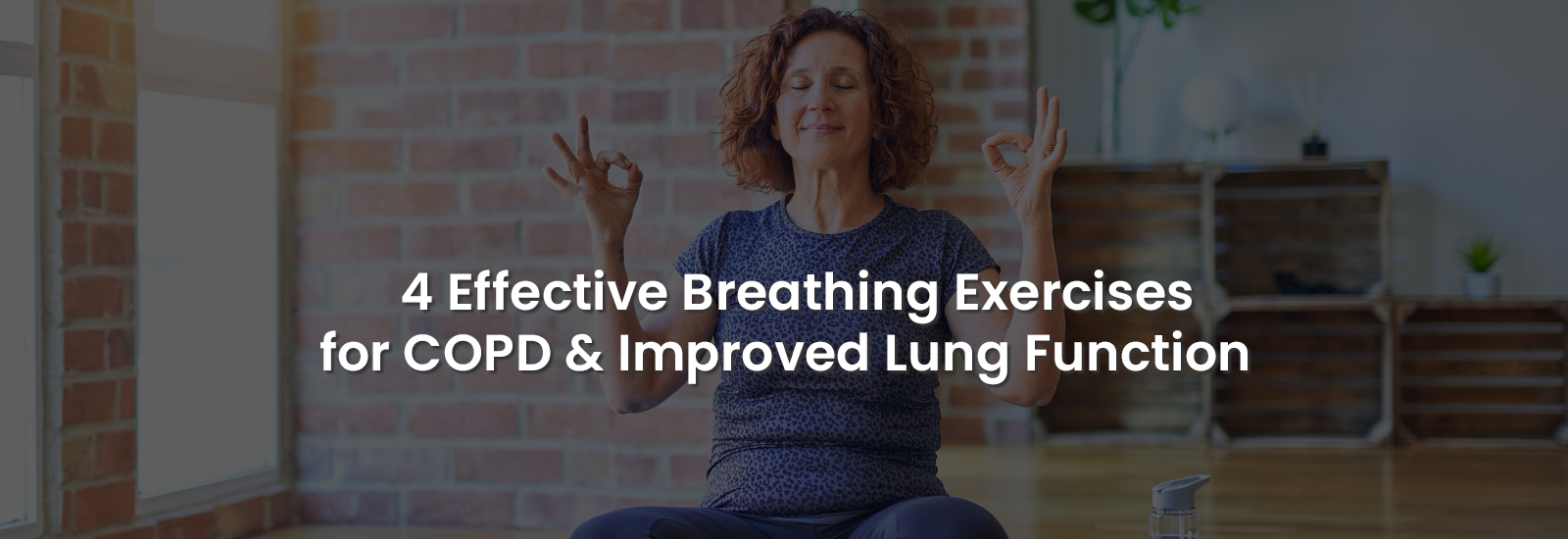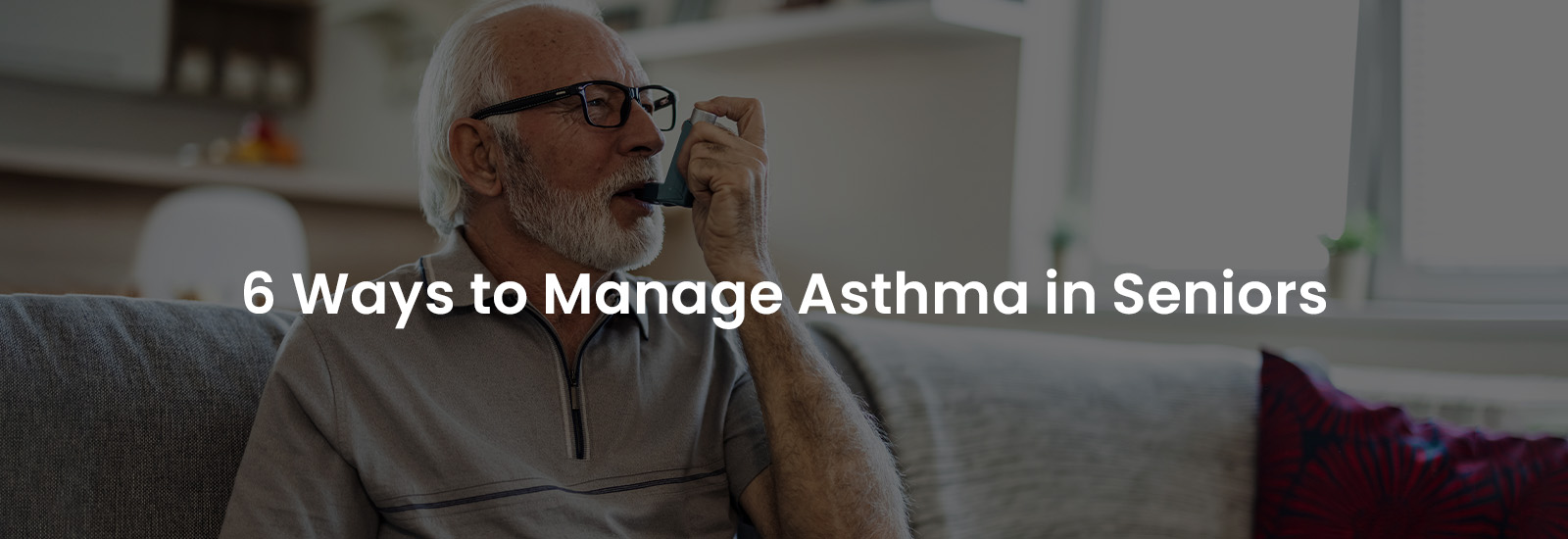
Indoor plants enhance the aesthetic appeal of living spaces and play an important role in improving indoor air quality. Medical clinics are increasingly turning to indoor plants known for their air-purifying properties to create a healthier environment. This is particularly important for seniors, who often spend more time indoors, especially during summer. Indoor houseplants can help seniors breathe easier all year long.
Indoor Air Quality
Indoor air quality refers to the condition of the air within enclosed spaces, such as homes, offices, and medical clinics. Unfortunately, indoor air can be polluted and contain harmful substances that adversely affect our health. Indoor air pollution is a growing concern, especially for seniors who may have limited mobility and spend more time in their living environments. Breathing in polluted air can aggravate respiratory symptoms, trigger allergies, and increase the risk of respiratory infections and diseases. Additionally, exposure to indoor air pollutants can increase the risk of cardiovascular problems and even certain types of cancer.
Seniors can also have a reduced immune response and decreased lung function, making them more susceptible to the effects of indoor air pollution. Breathing in clean air can alleviate respiratory symptoms, improve lung function, enhance overall well-being, and improve quality of life.
Common indoor air pollutants can originate from various sources, including
1. Volatile Organic Compounds (VOCs)
These are emitted by products such as paints, solvents, cleaning supplies, furniture, and carpets.
2. Particulate Matter
This includes dust, pollen, pet allergens, and other small airborne particles that can be inhaled and trigger allergies or respiratory issues.
3. Mold and Mildew
Moisture and humidity can lead to the growth of mold and mildew, which release spores that can cause respiratory irritation and allergies.
4. Tobacco Smoke
Smoking indoors can release harmful chemicals and particulate matter that significantly degrade indoor air quality.
5. Household Chemicals
Cleaning products, air fresheners, and pesticides can emit toxic fumes and pollute indoor air.
How Can Indoor Plants be Beneficial?
Indoor plants, often called “plants for breathing,” offer many benefits. By removing common indoor air pollutants like formaldehyde, benzene, and carbon monoxide, indoor plants create a healthier environment for seniors. According to a study, indoor plants create positive emotions and reduce negative feelings and physical discomfort.
The Best Indoor Plants for Seniors
When selecting indoor plants for seniors during the summer, it’s important to consider their specific needs, ease of care, and ability to thrive indoors. Some of the best indoor plants known for their air-purifying properties and suitability for seniors are as follows:
1. Snake Plant

Also called mother-in-laws’ tongue, is an excellent choice for seniors due to their air-purifying qualities. It converts carbon dioxide into oxygen at night and improves indoor air quality efficiently. Snake plants also remove toxins like formaldehyde and benzene from the air, promoting cleaner and healthier indoor environments at home or in healthcare clinics. Its low maintenance requirements and ability to tolerate low light conditions make them suitable for indoor areas with limited sunlight.
2. Peace Lily

A lush Peace Lilly is not only visually appealing but also an effective air purifier. During the summer, when temperatures rise, the peace lily’s ability to thrive in moderate to low light conditions makes it an ideal plant for seniors who may prefer to keep their living spaces cooler. It also helps to eliminate volatile organic compounds (VOCs) such as benzene, formaldehyde, and trichloroethylene. These pollutants can be commonly found in household cleaning products and can adversely affect respiratory health. It is important to note that peace lily is toxic to pets and little children who like to chew on leaves.
3. Areca Palm

With its graceful fronds and tropical appearance, it brings a touch of beauty and serenity to any living space. The areca palms offer several advantages during the warmer months. It acts as a natural humidifier, helping to increase moisture levels in the air. This can be especially beneficial for seniors who may experience dryness in their respiratory system or skin. The Areca Palm also effectively filters formaldehyde, xylene, and toluene. In addition to its health benefits, the Areca Palm is relatively low maintenance, making it suitable for seniors with limited mobility or who prefer plants requiring less attention.
4. Boston Fern

The plant is known for its graceful and feathery fronds. The Boston fern creates an elegant and lush appearance in any indoor setting. Boston ferns improve air quality by removing toxins and common pollutants. It also increases humidity levels in the surrounding air, creating a more comfortable and refreshing environment, which can be especially beneficial during hot summer days.
5. Spider Plant

These resilient plants have several features that make them ideal companions for seniors. They effectively filter out toxins from the air, such as formaldehyde, carbon monoxide, and xylene. Spider plants are relatively low maintenance, requiring minimal care and attention. Seniors can enjoy the lush green foliage and cascading siderites the plant produces, adding visual appeal to their living spaces. They are also non-toxic, making them safe for seniors and their pets.
6. Aloe Vera

Aloe vera is a versatile plant with various medicinal properties and a proficient air purifier. Its gel-filled leaves contain many healing properties, including soothing sunburns, promoting skin health, and alleviating skin irritations. Apart from healing properties, aloe vera also helps improve indoor air quality by filtering out pollutants commonly found in the summer, such as volatile organic compounds (VOCs).
Safety Tips for Indoor Plants in the Home
- Ensure that indoor plants are placed in stable containers and positioned securely to prevent accidental tipping or falling, which can pose a risk, especially for seniors with mobility issues.
- Be cautious when selecting plants with thorns or spiky leaves to avoid potential injuries. Opt for plants with softer foliage.
- Keep small and dangling plant parts out of reach, as they can be tempting for seniors with cognitive impairments or those prone to exploring with their hands or mouths.
- Regularly inspect plants for signs of pests or mold to maintain a healthy environment and prevent allergic reactions.
- Select non-toxic indoor plants to ensure the safety of seniors, particularly those with pets or grandchildren who may visit. This reduces the risk of accidental ingestion or allergic reactions.
To Sum Up
Indoor plants can enhance seniors’ respiratory health, mental well-being, and comfort. Seniors should be encouraged to embrace the beauty and benefits of indoor plants. By introducing these green companions into their living spaces, seniors can enjoy improved air quality, tranquility, and potentially positive effects on their physical and mental well-being. Moreover, taking care of indoor plants can serve as a rewarding and therapeutic pastime for seniors, promoting a sense of purpose and fulfillment.
For comprehensive healthcare services and guidance, Elite Care Health Centers is an invaluable resource for seniors. Our experienced primary care physicians specialize in senior care and can provide annual or routine exams tailored to individual needs. Our medical clinic also offers support and guidance in selecting the most suitable indoor plants for seniors, ensuring their well-being and safety.
